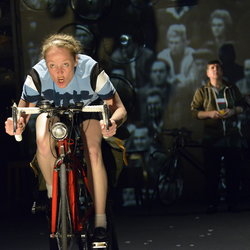Beryl (West Yorkshire Playhouse)
As cycling fever hits Yorkshire, the Playhouse presents Maxine Peake’s account of the life of one the region’s great cycling heroes

© Keith Pattison
In the opening lines of Maxine Peake‘s new play, Beryl, four actors on bikes admit that they’ve never heard of Beryl Burton – or only found something out by googling her name before the audition. I found this hard to believe, Beryl Burton having been a national heroine in my youth, but investigation in the interval showed that for younger people she is not even a name!
Well, they know who she is now! At the end of a play that becomes very moving despite the cartoon-style fun of much of the storytelling, the stage gradually fills with cups and trophies representing 25 years or more of incredible achievement in the world of women’s cycling (not, at the time, an Olympic event).
Beryl Charnock was born in Leeds in 1937, her education interrupted by illness, including 15 months hospitalisation with rheumatic fever, and found the outlet for her intense competitiveness when she joined Morley Cycling Club at the behest of Charlie Burton whom she married. A great all-rounder, she made road races, time trials and pursuits in Britain her personal fiefdom and picked up a few world titles, too!
Maxine Peake‘s text and Rebecca Gatward‘s direction are both simple and straightforward, but also deceptively subtle. Penny Layden plays Beryl with all the obsessive determination one could wish, but wit and humour, too, and John Elkington, Dominic Gately and Chelsea Halfpenny fill in around, playing all sorts of parts, Gately totting up the highest total, from the Queen to an East German policeman, while Elkington and Halfpenny at least get a sizeable part each, as Beryl’s husband and daughter, Denise, respectively.
The script moves from basic narration ("In 1962 Beryl Burton won the…") to scenes enacted with simple props improvised from articles scattered around Naomi Dawson‘s excellent garage set – four bikes on stands the key element. Script and direction cleverly create a situation where Layden, Halfpenny, Elkington and Gately are playing the actors who are playing these parts, so we have, for instance, the Halfpenny actor going wildly and amusingly over the top when playing a man and then defending herself against the Gately actor’s criticisms. The four integrate perfectly into an amiably willing ensemble.
The appearance of bumbling is often charming (as in the hopeless attempts to create a sidecar for young Denise), but the actors’ timing is spot-on and the sharpness, precision and imagination of the effects point to the presence of Mic Pool. The use of music and projections is well-judged and can be delightfully nostalgic. Never taking itself seriously as a play, Beryl leaves us in no doubt as to how seriously we should take the achievements of its subject.
Beryl continues at the West Yorkshire Playhouse until 19th July 2014













